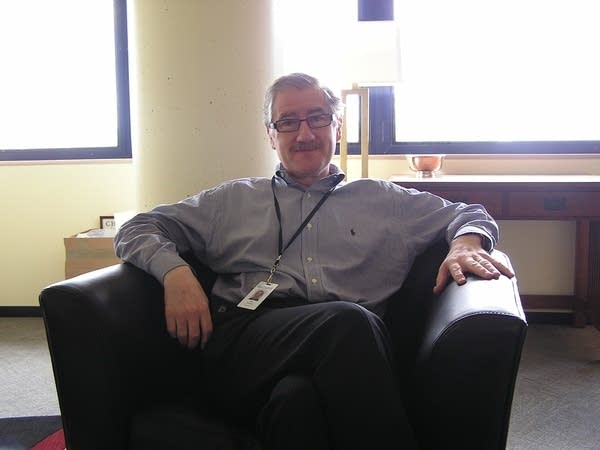Epic production explores history of Afghanistan

The politics of Afghanistan have confounded the West for centuries. A new production opening tomorrow at the Guthrie Theater in Minneapolis is designed to provide some explanation.
"The Great Game: Afghanistan" is an epic show, lasting seven and a half hours.
Why so long? Well, Nick Kent says, we live in what he calls a 50-minute culture, where we skim newspaper articles or watch just parts of TV shows, and don't delve into a subject.
"And I really wanted to get a very long day," he says. "So you actually sat down spent six hours really thinking about Afghanistan, really examining it."
Create a More Connected Minnesota
MPR News is your trusted resource for the news you need. With your support, MPR News brings accessible, courageous journalism and authentic conversation to everyone - free of paywalls and barriers. Your gift makes a difference.
Kent is artistic director of Tricycle Theater, the London-based company which conceived "The Great Game: Afghanistan" and will perform the show at the Guthrie.
"It's an extremely easy country, it seems, to conquer," Kent says. "The problem is holding it."
"The Great Game: Afghanistan" is split into three parts.
"Each is a group of four plays," he said. "They last about two and a half hours."
The first part is called "Invasions and Independence," which covers the period between the British invasion of Afghanistan in 1842 through the aftermath of Afghan independence in 1930.

"It starts with the greatest British defeat in British military history, when 16,000 British soldiers were withdrawing from Kabul and only one survived," Kent said. "15,999 were all killed."
When British diplomats suggest splitting the country to solve political strife, an emir responds by taking a map of Britain and arbitrarily chopping it into new countries.
"It's an extremely easy country it seems to conquer. The problem is holding it."
"The fact is that you are from a very small country which needs firm borders to stop you and your neighbors being forever at each other's throats," the emir in the play. "To impose such borders on an area as vast as this is to invite endless trouble. Perhaps, Sir Mortimer, you just don't understand this."
The second part of "The Great Game: Afghanistan" deals with the Russian invasion in 1979, followed by the rise of the Mujahedeen and then the Taliban.
The final installment "Enduring Freedom" begins in the days before the 9/11 attacks on the World Trade Center, then follows the U.S.-led invasion through the present.
Audiences can see the production over three nights, Wednesday, Thursday, and Friday. Or there's the option of a day-long, three-play marathon on Saturday or Sunday.

Twelve different playwrights including luminaries Lee Blessing and David Edgar provided the short plays which make up the larger whole.
Kent came up with the idea for using so many playwrights when one of the writers he approached came back with a proposal for a shorter piece. Like the history of Afghanistan, it proved complicated.
"And I felt rather like an air traffic controller, bringing my aircraft to land, one after another," Kent says. "Choosing the runways, the plots they would have, or the periods of history they would have and the timing of their landing. It was quite difficult, complex, but a lot of fun."
The play tackles the numerous wars and the resulting attempts to govern the country.
"Don't you want democracy rather than violence?" a British journalist asks the Afghan President Mohammad Najibullah in one play.

"You talk about democracy as though there were no violence within it. Democracy contains violence. Democracy is the demonstration of the potential violent power of the majority," another official says.
Actors also portray major figures in the story such as U.S. Gen. Stanley McChrystal, who was specially interviewed for the project.
First performed in London, "The Great Game: Afghanistan" has been nominated for an Olivier Award for outstanding performance.
There have been a number of special shows, including one which was exclusively for members of the British military. Kent says it was organized by the commander of the British forces in Afghanistan at the time.
"And he said publicly he thought he would have been a much better general had he seen these plays before he had embarked on that mission," Kent said.
After that show Tricycle Theater began providing free tickets for members of the British military who had either served, or were about to serve in Afghanistan.
The appearance of the Great Game at the Guthrie is part of the theater's effort to present more contemporary political drama. However it quickly developed into an international exchange. Nick Kent visited the Guthrie to arrange Tricycle's visit during the successful Tony Kushner celebration in 2009.

Guthrie Artistic Director Joe Dowling said Kent was very taken by "Tiny Kushner," a presentation of five short works by the playwright.
"And (Kent) said, 'I'd really like to bring these to my audience," Dowling said. "So the exchange worked out quite nicely on the basis that our actors from the Twin Cities actually got to play in London, and the British actors got to play here as part of the 'Great Game' tour."
Dowling said he likes theatrical marathons, and Twin Cities audiences have responded well to similar, day-long shows in the past. Nick Kent says having so many plays within a play is an advantage.
"It's like buses," he said. "If you don't like the first one, there'll be another one along in a half hour."
"The Great Game: Afghanistan" opens tomorrow at the Guthrie for a limited three week run, then moves on to San Francisco and New York.
